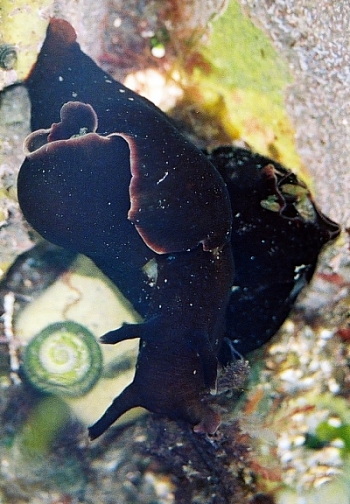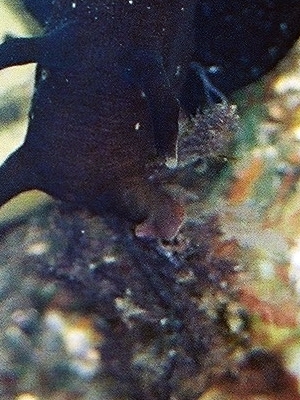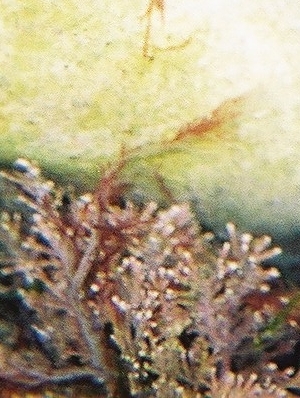Appetitive behaviour in Aplysia
August 21, 2006
From: Mark Henry

Dear Bill
Here's a picture of our old friend Aplysia. Whilst the animal demonstrates appetitive behaviour around this algae, it is not proof of a consummatory act. It is also possible that some surface, chemical aspect of this algae is palatable and the animal is checking it out. The algae looks like Corallina. Over to to you Bill what do you think?
Locality: Bridlington, 2 inches , Flamborough, England, North sea, 17 August 2006, rocky intertidal. Length: 50 mm. Photographer: Mark Henry.
Mark Henry
Mark06h@aol.com



Dear Mark,
Obviously from the other side of the world I can't say I can see what's going on in your rock pools more clearly than you. What I can say is that at times it is easy to be misled when observing feeding. I have included alongside part of one of your earlier photos because it shows the pale pink jointed calcareous coralline algae very well. It also shows the Aplysia waving around another red algae - which is certainly not a coralline.
I am afraid I can't see the dark reddish-brown algae your upper animal is interested in clearly enough to identify, but both it and the whitish clump in the middle right photo, have epiphytic soft algae growing on them which is what I suspect your Aplysia are eating. The only way to be sure is to watch them - perhaps in an aquarium for a few days. You could always kill and dissect them but that is a bit drastic, and you can still be fooled by 'bycatch' - that is bits of coralline broken off when eating epiphytic algae on the coralline. All I can say is that I have never seen Aplysia eating coralline algae and I can't recall any published reference to them eating coralline algae - but I could be wrong
Best wishes,
Bill Rudman
Related messages
-
Re: Aplysia punctata mating, spawning and variations
From: Joao Pedro Tojal Loia Soares Silva, October 3, 2007 -
Aplysia punctata from the Western Isles, Scotland
From: Lindsay Bradley, October 3, 2007 -
Aplysia punctata mating, spawning and variations
From: Joao Pedro Silva, August 20, 2007 -
Aplysia punctata mating
From: Jim Anderson, August 20, 2007 -
Re: Appetitive behaviour in Aplysia
From: Mark Henry, August 22, 2006 -
Markings on Aplysia punctata
From: Mark Henry, August 17, 2006 -
A summer spawn of Aplysia punctata
From: Mark.Henry, August 15, 2006 -
Sea Hare from Lochiver, Northwest Scotland
From: Colin Robertson, March 28, 2006 -
Spanish Sea Hares
From: Sascha Schulz, February 20, 2006 -
Sea Hare from Spain
From: Raul Castro, December 17, 2005 -
Aplysia punctata from Scotland
From: Cherry Welsh, August 19, 2005 -
Juvenile Aplysia from Norway
From: Kåre Telnes, July 30, 2005 -
Aplysia punctata from Croatia
From: Andrej Jaklin, March 4, 2005 -
Aplysia from Croatia
From: Andrej Jaklin, March 4, 2005 -
Age determination of Aplysia punctata
From: Marta K. Soffker, February 18, 2005 -
Aplysia punctata mating
From: Jim Anderson, November 27, 2003 -
Aplysia punctata from French Mediterranean
From: Marina Poddubetskaia, July 19, 2003 -
Aplysia punctata (adult) from French Brittany
From: Marina Poddubetskaia, April 29, 2003 -
Aplysia punctata (juvenile) from French Brittany
From: Marina Poddubetskaia, April 29, 2003 -
Aplysia punctata in aquarium
From: Michael, November 10, 2002 -
Re: commensal bivalve & Aplysia
From: Dr.Stephen R Hoskins, June 18, 2002 -
Re: Commensal bivalve - Sea Hare
From: Dr. Stephen R. Hoskins, June 17, 2002 -
Re: galeommatoidean commensal on Aplysia?
From: Serge Gofas , June 13, 2002 -
Aplysia punctata and commensal? bivalve.
From: Stephen Hoskins, June 8, 2002 -
Aplysia punctata in Germany
From: Peter Gleisenstein , May 31, 2002 -
Aplysia punctata & 'passengers'
From: Dr. Stephen Hoskins, May 16, 2002 -
Aplysia punctata from Portugal
From: João Tojal Silva, April 23, 2002 -
Aplysia punctata defensive mechanism
From: Marilyn Jackson, December 13, 2000 -
What does Aplysia punctata eat?
From: Trevor Shand, August 7, 2000 -
Observations on Aplysia punctata
From: Andy Horton, October 2, 1999
